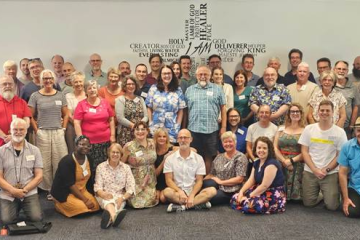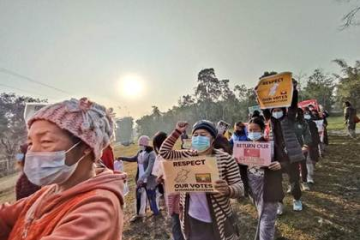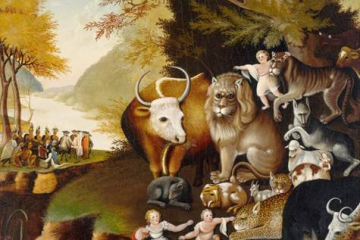Skinny cows – Genesis 45:1-15, Psalm 133
The story of Joseph makes up most of the last part of Genesis, from chapter 37, our reading last Sunday, to chapter 50, the end of the book, and our reading today, Gensis 45, is the climax of that story – which as we know (from our children’s talk today) involved; being sold as a slave (37:36), being accused of a crime he didn’t commit (39:14-19), being thrown into prison (39:20), being in prison for a long time – two plus years (41:1), being made Pharoah’s 2IC (41:40), , saving the world from starvation (41:57), and finally being reunited with his brothers (45:1-15) and his father as well.
It’s an amazing story, and also amazing, because, unlike the other stories of the patriarchs, that are short, independent sagas, the Joseph story is a single complete dramatic plot. Modern biblical scholars refer to it as a novella, a short romantic tale with descriptions of Egyptian court life, psychological insights, dramatic encounters and a main character with excellent communication and organisational skills, discretion, problem-solving ability, and a strong sense of responsibility. If Joseph sounds like the perfect public servant – he’s meant to – because he is the epitome of a wise man in the ancient world! Oh – and he’s also handsome and good-looking (39:6)! This is the perfect novella for Canberra!
There is also humour in this story – dark puns about ‘lifting the head’ in Gensis 40:19 when Joseph interprets the chief cupbearer’s and the chief baker’s dreams in prison. One’s head is lifted in honour. The other’s head lifted in execution! And there’s a twisted humour in the long cat and mouse game Joseph plays with his brothers, in chapters 42 to 44, down to his parting words to them, after his identity is revealed, in chapter 45, “Do not quarrel along the way!”
Years ago, when I was at Seaforth Baptist, we read Genesis 41, Pharaoh’s dream, in a staff meeting one day – the seven fat cows eaten by the seven thin cows and the seven good ears of grain swallowed by the seven thin ears – and its interpretation – that seven good years would be followed by seven years of famine. We were focusing particularly on verse 31, “The plenty will no longer be known in the land because of the famine that will follow, for it will be very grievous;” reflecting on how negative experiences can rob us of the positive in our lives. And then we moved into a time of prayer, praying for the needs of our church (youth group camp that weekend, people who were sick, needs in our own families) and suddenly my colleague, Vicki, prayed, “And Lord, please help us, please help us get the skinny cows out of the church!” which caused some consternation until the rest of us realised she was referring to the story, to attitudes that rob us of recognising God’s presence in our lives, that rob us of our energy to serve God and remove us from the path of reconciliation, we walk along, with one another.
So, this morning I want to look at these thirteen chapters of Genesis from that perspective – “getting the skinny cows out of the church – and out of our lives” – the attitudes that diminish God’s presence, our energies and service and detour us from the path of God’s grace.
For firstly, one of the constant reminders in the story of Jospeh (highlighted in the children’s talk today) is that in every stage of Joseph’s life – good and bad – God was with him! When he is sold as a slave (39:1), the next line is, “The Lord was with Joseph…” When he is thrown into prison, the next line is, “But the Lord was with Joseph and showed him steadfast love.” When he advises Pharoah on preparing for the coming famine, Pharaoh acknowledges it (41:38), “Can we find anyone else like this – one in whom is the spirit of God.” And in our reading today, Joseph says three times, “God sent me before you to preserve life (verse 4)… God sent me before you to preserve for you a remnant on earth (verse 7)… God made me a father to Pharaoh….and lord of all Egypt (verse 8 and 9).”
Many of you would acknowledge this in your own lives. God has been with you. And in the very difficult times, the tragic or painful or scary times, you have leant even more heavily on God’s comforting presence. There is the expression that there are no atheists in foxholes.
However, there are also times when misfortune follows misfortune, when the blows come from unexpected places, when the fear is great or suffering goes on and on. (Like the line in Genesis 37, when Jacob is tricked into believing Joseph is dead, where it says Jacob, “refused to be comforted, and said, “No, I shall go down to Sheol (the place of the dead) to my son, mourning.”) These are the times when the skinny cow of doubt and despair threaten to completely consume our faith and our confidence in God.
I am reminded of the story of Martin Luther King (whose dream we referred to last week) who faced harassment from police, time in jail and death threats. One night after an anonymous caller had rung his home threatening to kill him and his family, he says he was terrified. He sat in the kitchen thinking about his young children and his wife, and knew, “I was weak… religion had to become real to me.” So, he prayed, “‘Lord, I’m down here trying to do what’s right. I think I’m right. I think the cause we represent is right. But Lord, I must confess that I’m weak now. I’m faltering. I’m losing my courage…And [he says] it seemed to me… I could hear an inner voice saying to me, ‘Martin Luther, stand up for righteousness. Stand up for justice. Stand up for truth. And lo, I will be with you, even until the end of the world.’…I heard the voice of Jesus saying still to fight on. He promised never to leave me, never to leave me alone. No never alone… No never alone. He promised… never to leave me alone.”
Three nights later, a bomb was exploded on the front veranda of their house, though no one was hurt. And King says, “My religious experience a few nights before had given me strength to face it.” Throughout his ministry he returned to that experience to strengthen him as he faced terrible difficulties.
God help us, God help us to face the skinny cows of discouragement and despair with the knowledge that God has promised to never us, to never leave us alone.
The second element of Joseph’s story, highlighted in the section we read, is the acknowledgement of God’s sovereignty over our lives. I can’t help thinking of Hamlet’s line, “There’s a divinity that shapes our ends rough-hew them how we will.”
Yet, while Joseph acknowledges that God brought good out of evil, he does not dismiss the evil of his brothers. 45:4, “I am your brother, Joseph, whom you sold into Egypt.” He does not attribute that evil act to God. And, in the difficult situations he faces, he does not sit on his hands waiting for God to deliver him. No! He uses all those excellent public service skills, we’re told, to be successful; as overseer of Potiphar’s house and business, as administrator of the royal prison and as second in command over all of Egypt.
Olt Testament scholar Walter Brueggemann sums up the story this way, “Neither the freedom of the creature nor the gracious sovereignty of God is cancelled.” We are accountable for the evil we do and responsible for doing good we can, as God works in us and around us to bring life and reconciliation to our world.
God help us, God help us to face the skinny cows of not taking responsibility – both for our sins and for the blessings we can bring. Help us share God’s work of life and reconciliation.
Finally, the story of Joseph is just that – a story of sharing God’s work of life and reconciliation.
I took issue with one commentary I read this week. It looked at our reading, the story of Jospeh and his brothers, and laid out a set of principles for biblical forgiveness. i.e Biblical forgiveness should be granted quickly, freely and unconditionally, sacrificially, and seek the correction and restoration of the offender.
Yes. Quick forgiveness is a wonderful ideal. “Do not let the sun go down on your anger,” says Ephesians 4. Yes, free and unconditional forgiveness is wonderful! And yes, forgiveness is sacrificial. But in our haste to tell people to forgive and how they should forgive, we run the risk of further injuring those who are victims and those who are vulnerable.
What I think the story of Jospeh tells us is the reality – that the path of forgiveness is hard and sometimes long. You see this in the names he gives his children; Genesis 41, Manasseh, meaning “God has made me forget all my hardship and all my father’s house”, and Ephraim, “For God has made me fruitful in the land of my misfortunes.” Jospeh has clearly not entirely forgotten. You see this in the trauma, that cat and mouse game I mentioned earlier, that he plays on his brothers; Genesis 42 and 43; threatening to throw them into prison, keeping Simeon hostage till they return with Benjamin (breaking his father’s heart further in this process), framing them as thieves and insisting Benjamin become his slave. It is a test of their changed characters, but it is also Jospeh walking, somewhat zig-zaggedly, the hard path of forgiveness. And even after his father’s death (Gen 50) when the brothers again beg his forgiveness, Jospeh, while not explicitly forgiving them, reiterates that God used their harmful actions for good and commits to provide for them – and not to harm them – in the future.
The path of forgiveness is hard. It can be long, and restored relationships may need to look different to the relationships that were there before. As people, however, who serve a God who is reconciling all things, we are to walk this difficult path! As Ephesians 4 says, we are “to walk in the manner worthy of the calling to which [we] have been called, with all humility and gentleness, with patience, bearing one another in love, making every effort to maintain the unity of the Spirit in the bond of peace.” [and finally] we are to “Be kind to one another, tender-hearted, forgiving one another, as God in Christ has forgiven you.”
We are to walk the path of forgiveness because we belong to a God who walks that path.
Let me tell you one last story about dreams.
There was a Catholic priest in the Philippines who had done something very wrong in his early life and had acknowledged it and repented, but he continued to agonise over whether God had forgiven him. And in his church was a woman who claimed she had visions where she spoke with Christ and he with her. The priest was sceptical. To test her he said, “The next time you speak with Christ, ask him about the sin I committed when I was at Bible college.”
A few days later the priest met with her. “Did you visit with Christ in your dreams again?” he asked.
“Yes,” she said.
“And did you ask him about the sin I committed in Bible college?”
“Yes.”
“What did he say?” the priest asked.
“He said, ‘I don’t remember.’”
“As far as the east is from the west,” Psalm 103:12 says, “so far he removes our transgressions from us…for as the heavens are high above the earth….so great is his steadfast love.”
God help us, God help us to get rid of the skinny cows of forgetting that love, of forgetting that (I Corinthian 5:19) “in Christ, God is reconciling the world to himself, not counting our trespasses against us, and entrusting the message of reconciliation to us”, of forgetting that God will walk the path of forgiveness with us for as long as it takes. Amen.


